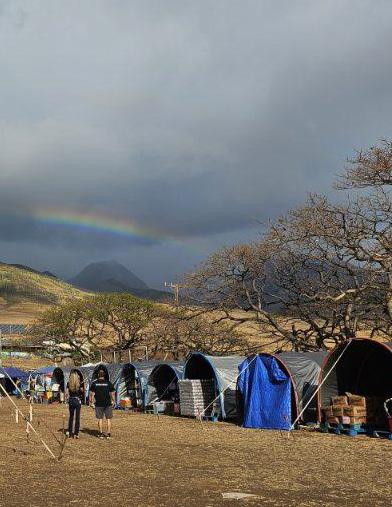
4 minute read
Kāko'o I Nā Kānaka
from No Nā Kānaka
Our Journey Serving The People
War Memorial Shelter
An elderly woman walks into the War Memorial. She has bandages around her feet and hands where she was burned while fleeing for her life. She has just lost everything to a devastating wildfire that burned much of her home town and she is in shock and disoriented, her cell phone doesn’t work and there’s no way to find out if her loved ones made it out alive. The shelter is crowded and she feels numb and unsure how to navigate this unthinkable reality. She hangs her head, weighed down by so many unanswered questions, as tears course down her face.
A gentle touch at her elbow causes her to look up. “Hello Aunty, you don’t need to say anything. My name is Nettie and I am here to help you find a bed and make sure you are taken cared of.” The kind words and steady presence of this woman at her side is an anchor she can hold onto, the simple guidance, to find a bed, a path she can follow in this moment. This one moment is all she can manage. “I will come see you every day Aunty to make sure you have what you need.” Nettie sits quietly holding her hand as she cries.
In the wee hours of August 9th, survivors from the devastating fires, some that had to flee for their lives, continued to show up at the War Memorial shelter. We saw humanity at its most fragile— people in shock, afraid, many with injuries and burns, completely stripped of all they held dear and thrust into this foreign land of makeshift cots and communal living. They came from all walks of life into this shared space, the elderly, disabled, babies and children, families that had lost touched with loved ones and feared the worst.
We do not realize how much we take for granted until it is gone, or until we are helping someone that has just lost everything—the home we live in, the food we eat, the clothes we wear, the car we drive, the simple tasks that accompany our day to day life, brushing our teeth, using the bathroom, taking a shower.
Nā Kia’i O Maui’s origin story starts in the incredible outpouring of human kindness and compassion we took part in at the War Memorial over a period of two weeks. Under the steadfast leadership of Aunty Nettie Aquino, a grassroots group dubbed “Da Hui” immediately organized to manage volunteers and donations while also providing loving direct support to survivors at the shelter.
Aunty Nettie shares what those early days were like: “our hui was the one that sat with them right after. FEMA and Red Cross didn’t show up right away. Not everyone can be in that space, not everyone will understand how much it took just to be present in the face of such brokenness and loss. We needed to be strong when we were with survivors, we would sit there and let them cry keeping our tears in until we could go in the back. Then we armor up and come back out with a smile, ready to serve.”
Da Hui provided critical support to survivors from day one and throughout their stay at War Memorial. This included making sure they felt welcomed, getting them settled in upon arrival, organizing volunteers and donations, setting up a free “store” for survivors to meet all their essential needs, assisting elderly and disabled with showering and personal care, providing individual support tailored to unique needs— and even before roads opened, sending donated goods out to hubs in Lahaina (initially by boat and helicopter) and throughout Maui where survivors were sheltering.
When War Memorial was shutting down and survivors being moved to hotels, many families were apprehensive about the transition. Da Hui volunteers had built relationships with survivors and were able to answer their questions, share important information, and most importantly reassure them that they would be okay enabling them to take the next step in their long healing journey. Da Hui then spent a week as ambassadors at the hotel at the request of Red Cross connecting folks to wrap around services and systems of support.


‘A‘ohe hana nui ke 'alu ‘ia
No task is too difficult when done together by all.
‘Ōlelo No‘eau, Traditional Hawaiian Proverb

